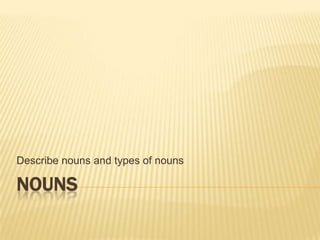
Nouns
- 1. Describe nouns and types of nouns NOUNS
- 2. NOUNS Nouns are naming words. Everything we see or are able to talk about is represented by a word which names it - that word is called a 'noun'. There are names for people, animals, places, objects, substances, qualities, actions and measures.
- 3. NOUNS Examples: soldier - Alan - cousin - Frenchman (< names for people) rat - zebra - lion - aardvark (< names for animals) house - London - factory - shelter (< names for places) table - frame - printer - chisel (< names for objects) lead - nitrogen - water - ice (< names for substances) kindness - beauty - bravery - wealth - faith (< names for qualities) rowing - cooking - barking - reading - listening (< names for actions) month - inch - day - pound - ounce (< names for measures)
- 4. common nouns.proper nouns.collective nouns.pronouns.countable nouns.uncountable nouns. THE DIFFERENT TYPES OF NOUNS
- 5. COMMON NOUNS A common noun is the word used for a class of person, place or thing. Examples: Car Man Bridge Town Water Metal Ammonia
- 6. PROPER NOUNS A proper noun is the name of a person, place or thing (i.e., its own name). A proper noun always starts with a capital letter. Examples: Michael Africa Peking Dayton Peace Accord United Nations The Tower of London Uncle George ("Uncle" is written with a capital letter because it is part of his name.) My favourite auntie is Auntie Sally. (In this example, the first "auntie" is a common noun; whereas, the second "Auntie" is part of a proper noun.) The Red Lion
- 7. COLLECTIVE NOUNS A collective noun is the word used for a group of people or things. Examples: Choir Team Jury Shoal Cabinet (of ministers) Regiment
- 8. PRONOUNS A pronoun is a word used to replace a noun. James is the first choice for the post. He has applied for it twice already. ("He" is a pronoun. In this example, it replaces the proper noun "James".) ("It" is a pronoun. Here, it replaces the common noun "post".) Some / Who / This (The term 'pronoun' covers lots of words, and all three words above are classified as pronouns. There is whole section dedicated to pronouns.
- 9. COUNTABLE NOUNS They are things that we can count. For example: "pen". We can count pens. We can have one, two, three or more pens. Here are some more countable nouns: dog, cat, animal, man, person bottle, box, litre coin, note, dollar cup, plate, fork table, chair, suitcase, bag
- 10. COUNTABLE NOUNS Countable nouns can be singular or plural: My dog is playing. My dogs are hungry. We can use the indefinite article a/an with countable nouns: A dog is an animal. When a countable noun is singular, we must use a word like a/the/my/this with it: I want an orange. (not I want orange.) Where is my bottle? (not Where is bottle?) When a countable noun is plural, we can use it alone: I like oranges. Bottles can break.
- 11. COUNTABLE NOUNS We can use some and any with countable nouns: I've got some dollars. Have you got any pens? We can use a few and many with countable nouns: I've got a few dollars. I haven't got many pens.
- 12. UNCOUNTABLE NOUNS We cannot "count" them. For example, we cannot count "milk". We can count "bottles of milk" or "litres of milk", but we cannot count "milk" itself. Here are some more uncountable nouns: music, art, love, happiness advice, information, news furniture, luggage rice, sugar, butter, water electricity, gas, power money, currency
- 13. UNCOUNTABLE NOUNS We usually treat uncountable nouns as singular. We use a singular verb. For example: This news is very important. Your luggage looks heavy. We do not usually use the indefinite article a/an with uncountable nouns. We cannot say "an information" or "a music". But we can say a something of: a piece of news a bottle of water a grain of rice
- 14. UNCOUNTABLE NOUNS We can use some and any with uncountable nouns: I've got some money. Have you got any rice? We can use a little and much with uncountable nouns: I've got a little money. I haven't got much rice.
- 15. Here are some more examples of countable and uncountable nouns: Countable Uncountable Dollar money Song music Suitcase luggage Table furniture Battery electricity Bottle milk Report information Tip advice Journey travel Job work View scenery
- 16. EDITED BY: AIDA SUZANA BINTI AMBAK With courtesy of www.englishclub.com
